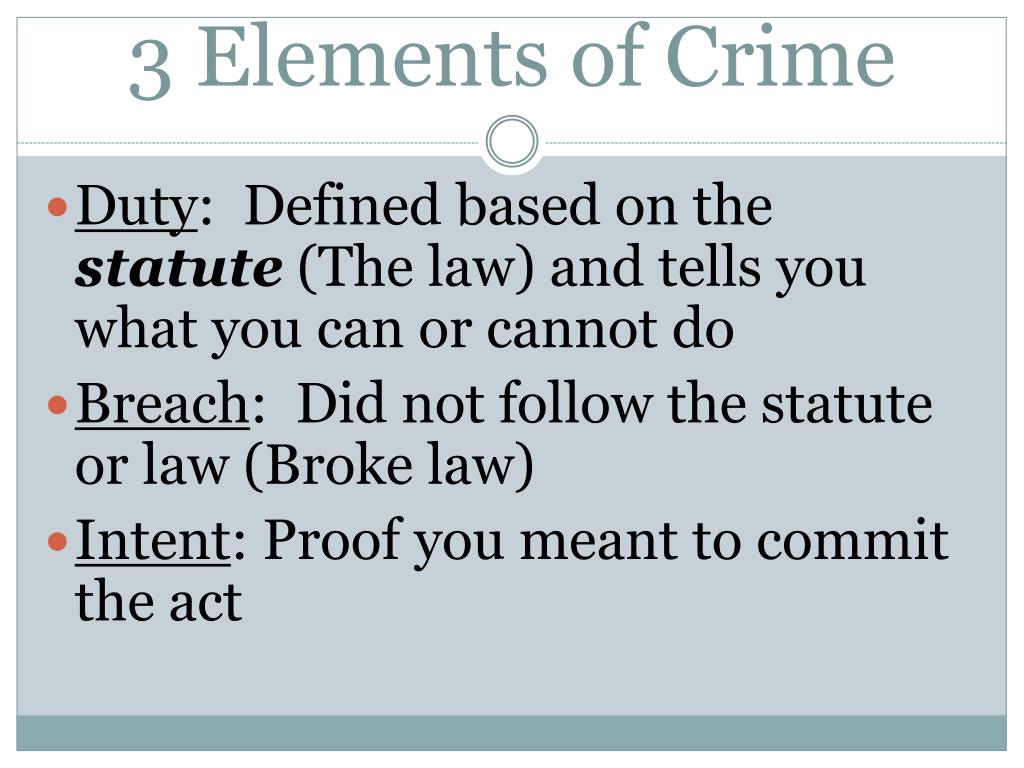
Lastly, knowledge/awareness crimes are those in which the defendant must have known or been aware of the facts surrounding the commission of the offense.

Still, establishing a motive does strengthen any claims of intent. In other words, prosecutors don’t have to prove why you committed a crime, just that you did so knowingly and willingly. Motive refers to why a person committed a crime and is not necessary when proving mens rea.


Without specific intent, the crime might be reduced to breaking and entering. A good example of a specific intent crime is burglary, as the prosecutor would need to prove that the defendant intended to commit theft or another felony inside of someone’s home. Specific intent crimes are those in which the prosecutor must prove that the defendant had a particular goal or end-game in mind when they committed the offense. An example of a crime with general intent would be assault, as prosecutors only need to prove that the defendant intended to cause harm, but not kill the victim. General intent refers to crimes in which there is no requirement for proof beyond a reasonable doubt about what was going on in the defendant’s mind. There are four main types of mens rea: General intent, specific intent, motive, and knowledge/awareness. If this cannot be proven, either because the defendant was not capable of criminal intent, or was unaware of the situation, they can still be convicted (e.g., of involuntary manslaughter), but the sentence probably won’t be as harsh. To secure a murder conviction, for example, prosecutors must not only prove that the defendant committed the offense, but that they intended to do so. Mens rea is Latin for “guilty mind,” and this element refers to the defendant's mental state when they committed the crime. This is a significant exception to the general rule that only physical actions are criminal: Certain acts, like conspiracy and solicitation, comprise an actus reus even if no physical crime was committed (e.g., conspiracy to commit murder). Lastly, while thoughts can never be considered a crime, uttered words can. Apart from the often mentioned example of a person drowning while someone was nearby (which is quite tricky to prove), the more common cases of unlawful omission are failure to pay taxes, alimony, child support, or failing to take care of your child. This is usually in cases when a person could've saved another person's life without putting their own in danger. The so-called unlawful omission of an act refers to situations where the defendant was under a legal duty to act. However, the lack of action can also be considered a criminal act. If, however, they were to walk into the bank with a gun and demand money from the teller, this would constitute actus reus, and they could be charged with robbery. No law recognizes thought as a criminal act (yet) hence, for something to be considered a crime, there has to be an act (i.e., conduct) that constitutes a crime in a specific jurisdiction.įor example, if someone is planning to rob a bank, they have not yet committed a crime (as there has been no action).

Latin for “guilty act,” this refers to the actual act of committing a crime. Felonies, on the other hand, are more serious offenses that can result in years behind bars (or even life in prison). Misdemeanors are less severe crimes punishable by a year or less in jail. For someone to be convicted of a crime (and face the consequences associated with that conviction), there must be evidence proving the defendant committed each element of said crime. In the US, crimes are generally broken down into two main categories: Misdemeanors and felonies. If you’re looking to work in criminal law or land a criminal justice job, knowing the elements of a crime is crucial. In this article, we will discuss each element, as well as some others, and explain why they are crucial for navigating the United States legal system. These include actus reus, mens rea, the concurrence of the previous two elements, and causation. While some crimes require additional components (this can also vary by jurisdiction), there are a few critical elements to every crime in the United States. Under US law, elements of a crime represent a set of facts that have to be proven beyond a reasonable doubt to convict a defendant of a crime.


 0 kommentar(er)
0 kommentar(er)
